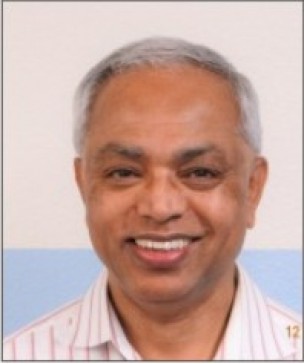| Name |
Krishna V. Subbarao |
| Designation |
Plant Pathologist |
| Complete postal Address with city code |
|
| Email IDs |
kvsubbarao@ucdavis.edu |
| Mobile No. |
|
Brief Biodata
Krishna V. Subbarao was born in 1958 in Periyapatna,
Mysore District, Karnataka. He obtained
his B.S. from Yuvaraja’s College, Mysore and M.S. in Plant Pathology from Manasagangothri,
University of Mysore, and Ph.D. in Plant Pathology in 1989 from Louisiana State
University, Baton Rouge, USA. Dr. Subbarao then took up postdoctoral researcher
positions at Louisiana State University and University of California at Berkeley
prior to joining the faculty of the Department of Plant Pathology in 1992 at
the University of California at Davis, where he is currently a full
professor.
Prof. Subbarao’s career research achievements have come from
the study of two fungal pathogens, Sclerotinia
spp. and Verticillium spp. He utilized
these systems for his pioneering research addressing some of the most complex
and persistent questions in these two systems. Prof. Subbarao developed a highly innovative, yet very practical,
knowledge base of soilborne disease management including quantitative models to
minimize inoculum and disease dynamics between seasons and elucidated mechanisms
of soil suppressiveness. The framework
developed has become the standard approach for managing diseases caused by
these two pathogens worldwide.
Prof.
Subbarao’s group elucidated the fastidious environmental conditions for ascospore
production and the reasons for differential distribution of S. sclerotiorum and S. minor in the world. This meticulous work over two decades has
provided a lucid understanding of the unique niches occupied by the Sclerotinia species. His group has
also characterized the process by which ascospore production and maturity of S. sclerotiorum is synchronized,
providing new insights into the reproductive biology of this pathogen. Finally, the results from the study of the
mating type locus of S. sclerotiorum were
unexpected and exciting. They showed
that parts of the mating type locus MAT in
S. sclerotiorum was inverted in
exactly half of all sexual progeny, independent of whether the inversion was present
in the parent. This original discovery
may underlay the process of mating type switching in filamentous ascomycetes
for which no molecular bases have been known.
Prof. Subbarao is perhaps best known for his seminal
studies on Verticillium wilt caused by Verticillium
dahliae and other Verticillium spp. V. dahliae is a pathogen of great genetic plasticity, can infect
more than 200 plant species and the list of potential hosts is continually
expanding. Employing molecular phylogeny, his group resolved the
longstanding taxonomic problems in the genus Verticillium and it also led to the discovery of five species new
to science. In recent years, he has focused on the population genetic analyses
of a global population of V. dahliae that
identified northern Europe as the source population for all V. dahliae in the world. Prof. Subbarao
in a series of well-conceived studies, determined that broccoli cultivation not
only significantly reduced soil inoculum, but also wilt incidence and severity
in subsequent susceptible crops. Unlike soil fumigation, rotations with broccoli do not eradicate the
pathogen, but maintain soil microsclerotia below the threshold at which crop
losses accrue, despite the cultivation of susceptible crops. He obtained empirical data on the mechanisms
of broccoli-induced V. dahliae suppression using a combination of soil
microbiology, soil chemistry, and molecular cytology. He demonstrated that not all glucosinolates
and their catabolic products are involved in pathogen suppression and that V. dahliae suppression
by broccoli involves multiple factors (e.g., the type of glucosinolates and
their catabolic products, soil microbial community communities). This
interdisciplinary work lays the knowledge foundation for an economically feasible
disease management practice in this and other pathosystems.
Prof. Subbarao possesses a
prolific publication record with over 180 refereed journal articles in addition
to the many reviews and book chapters he has published. He is currently editing the Lettuce Compendium published by the APS
Press. He has also overseen the research of staff,
undergraduates, graduate students working toward the Ph.D. degree, and 22
postdocs from diverse cultural backgrounds.His former associates are pathologists in government and academia, with six
being faculty in land grant universities in the USA. Prof.
Subbarao is currently the Editor-in-Chief of Phytopathology, previously served two terms as a Senior Editor and
also a term as an Associate Editor in Phytopathology.

